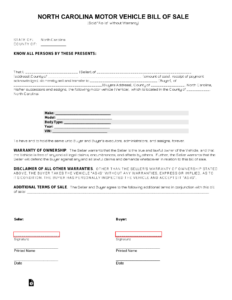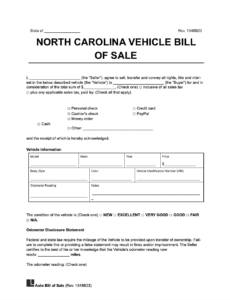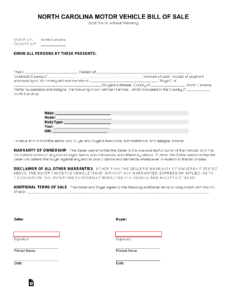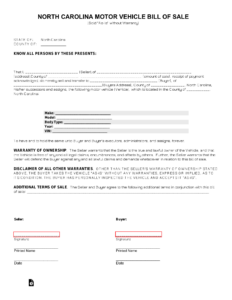When you’re buying or selling a vehicle in North Carolina, one document often stands as the cornerstone of a smooth and legally sound transaction: the bill of sale. It might seem like just another piece of paper, but this simple document provides crucial protection for both the buyer and the seller, ensuring that the transfer of ownership is clear, documented, and legally binding. Without it, you could face unexpected complications down the road, from registration issues to disputes over the vehicle’s condition or sale price.
Think of the bill of sale as a detailed receipt and an official record of the change in ownership. It acts as verifiable proof of the transaction, detailing who sold what, to whom, for how much, and on what date. Whether you’re purchasing a classic car from a private seller or selling your old sedan, having a properly filled-out bill of sale is not just a good idea, it’s an essential step that brings peace of mind and simplifies future interactions with the North Carolina Division of Motor Vehicles (NCDMV) and other relevant parties.
What to Include in Your North Carolina Vehicle Bill of Sale Template
A comprehensive vehicle bill of sale in North Carolina isn’t just about jotting down a few details; it’s about capturing all the necessary information to clearly define the transaction. This document serves as your official record and can be critical for registration, title transfer, and even tax purposes. Ensuring every crucial detail is accurately recorded protects both parties from potential misunderstandings or legal challenges after the sale has been completed.
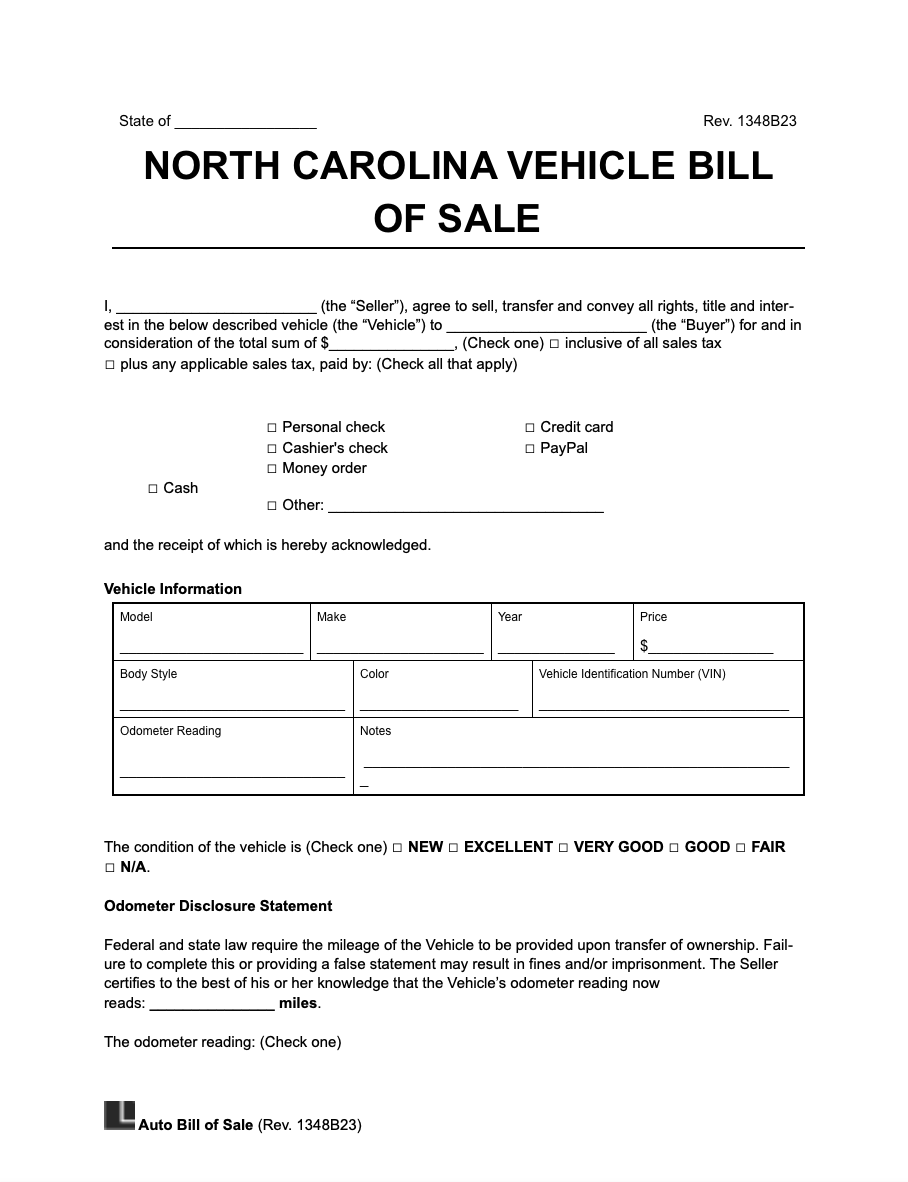
Buyer and Seller Identification
First and foremost, the bill of sale must clearly identify both the buyer and the seller. This includes their full legal names, current physical addresses, and contact information. For individuals, this is usually straightforward. If one of the parties is a business, include the official business name and address. This ensures that there is no ambiguity about who is entering into the agreement.
Comprehensive Vehicle Details
The core of the transaction, the vehicle itself, needs to be described in detail. This section should leave no room for doubt about which specific vehicle is being sold. Key information includes the vehicle’s year, make, and model. Crucially, the Vehicle Identification Number (VIN) must be accurately recorded, as this unique identifier links the bill of sale directly to the specific vehicle and its title. You should also include the current odometer reading at the time of sale, as this is often required for title transfers and can prevent later disputes regarding mileage.
Financial and Transaction Specifics
This part covers the monetary aspects of the sale. Clearly state the agreed-upon sale price in both numerical and written form to prevent any discrepancies. Also, specify the date of the transaction. If there are any specific terms of sale, such as “as-is” clauses or details about payment methods, these should be explicitly mentioned to ensure full transparency. While a standard north carolina vehicle bill of sale template might not always include an “as-is” clause by default, it’s a vital consideration for private sales to protect the seller from future claims regarding the vehicle’s condition.
Signatures and Witnesses
Finally, for the document to be legally binding, it must be signed by both the buyer and the seller. Each signature should be accompanied by the date it was signed. While North Carolina typically does not require a vehicle bill of sale to be notarized for basic title transfer, having signatures of witnesses can add an extra layer of validity and security, especially for high-value transactions or if there are any unique terms involved. Always make sure both parties receive a signed copy of the completed bill of sale for their records.
Why You Absolutely Need a Bill of Sale in North Carolina
Beyond being a mere formality, a bill of sale serves several critical functions that protect both parties involved in a vehicle transaction within North Carolina. It’s more than just proof of purchase; it’s a legal safety net that can prevent a multitude of headaches down the line. Failing to obtain or provide a proper bill of sale can lead to significant complications for both the buyer and the seller, making future interactions with state agencies or potential legal disputes far more challenging.
For the buyer, the bill of sale is indispensable for proving ownership and registering the vehicle with the NCDMV. When you go to transfer the title into your name, the DMV will require documentation of the sale. Without a clear record, you might encounter delays or even outright rejection of your registration application. It also provides a clear record of the purchase price, which is essential for calculating sales tax and understanding the total cost of your new vehicle. This document also serves as your initial proof of ownership should any issues arise before the title is officially transferred.
Sellers also gain substantial protection from a well-executed bill of sale. Once you sell your vehicle, you want to ensure that liability for that vehicle transfers to the new owner. This includes responsibility for traffic violations, accidents, and any other incidents that might occur after the sale. The bill of sale acts as concrete evidence of the date and time the vehicle left your possession and became the responsibility of the buyer. This clear transfer of liability is crucial for your peace of mind and legal protection, ensuring you are no longer accountable for a vehicle you no longer own.
Moreover, the bill of sale aids in preventing fraud and resolving potential disputes. Should there be any disagreement about the sale price, the condition of the vehicle at the time of sale, or even the date of the transaction, a detailed bill of sale provides a definitive record that can be presented as evidence. This level of documentation is invaluable in any legal or administrative context. It provides a shared, agreed-upon account of the transaction, minimizing ambiguity and supporting a fair resolution should discrepancies arise.
Completing a thorough bill of sale is an incredibly smart move for anyone involved in a private vehicle sale in North Carolina. It provides a clear and undeniable record of the transaction, protecting both the buyer and the seller from potential legal entanglements and administrative hurdles. By taking the time to properly document the sale, you ensure that the change of ownership is seamless and legally sound.
Ultimately, making sure you have a complete and accurate bill of sale in your possession, whether you are the one buying or selling, is a testament to a responsible transaction. It solidifies the agreement, provides the necessary documentation for official processes, and acts as a key safeguard against unforeseen issues. This simple document truly provides a foundation of security for both parties involved, allowing everyone to move forward with confidence.
